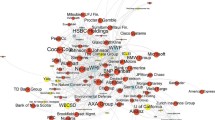Abstract
European integration is a process in which national governments look for higher levels of integration and promote new requests for allocations from the supranational authority while the balance between the benefits and costs of the supranational collective action becomes increasingly favourable. This process may be analyzed as an agency problem where different national governments, acting as principals, try to lead a single agent—the supranational authority—to make a decision on the level of integration. In this paper, decisions on integration of equilibrium are studied as the result of a non co-operative two-stage game, where national governments outline their political support strategies in the first stage and the supranational authority decides the level of integration in the second stage.
Similar content being viewed by others
References
Baldwin, R. & Venables, A. (1995). “Regional Economic Integration.” In G. Grossman and K. Rogoff, (eds.), Handbook of International Economics, Vol. III, North-Holland, 1597–1644.
Bamberg, G. & K. Spremann, (eds.) (1987). Agency Theory, Information and Incentives, New York, Springer.
Bean, Ch. (1992). “European and Monetary Union in Europe.” Journal of Economic Perspectives, Autumn, 31–52.
Bernheim, B.D. & M.D. Whinston, (1986). “Menu Auctions, Resource Allocation, and Economic Influence.” Quarterly Journal of Economics. 101(1), 1–31.
Buchanan, J. & G. Tullock, (1962). The Calculus of Consent: Logical Foundations of Constitutional Democracy, Ann Arbor. University of Michigan Press.
Cebula, R. J. & Kafoglis, M. Z. (1981). “The Buchanan-Tullock Model: Some Extensions.” Public Choice. 36, 179–186.
Cebula, R. J. & Kafoglis, M. Z. (1983). “In Search of Optimum Relative Unanimity.” Public Choice. 40, 195–201.
Cecchini, P., M. Catinat, & A. Jacquemin, (1988). The European Challenges 1992: The Benefits of a Single Market, Aldershot: Wildwood House.
De Grauwe, P. (2000). Economics of Monetary Union, Oxford, Oxford University Press.
Eichengreen, B. (1995). “European Monetary Unification.” Journal of Economic Literature. January, 162–172.
Faiña, J. A., Garcia Lorenzo, A. and J. Lopez-Rodriguez (2005). “The Powers of the Central Governments and the Problems of Enlarging and Deepening the European Union: An Essay of Constitutional Political Economy”, Constitutional Political Economy, 16, pp. 369–386.
Levitt, M. & Lord, C. (2000). “The political economy of monetary union.” European Union Series. New York: St. Martin's Press.
Michelmann, H. & Soldatos, P. (eds.) (1994). European Integration. Theories and Approaches. Maryland. University Press of America.
Molle, W. (1990). The Economics of European Integration, Dartmouth Publishing Co.
Pelkmans, J. (2001). European Integration. Methods and Economic Analysis, London. Prentice Hall.
Toumanoff, P. (1989). “Economic Factors in Institutional Choice.” Papers on Democracy. Bradley Institute for Democracy and Public Values, Marquette University.
Wickström, B. (1986). “Optimal Majorities for Decisions of Varying Importance.” Public Choice. 48, 273–290.
Wright, P., Mukherji, A. & Kroll, M.J. (2001). “A Reexamination of Agency Theory Assumptions: Extensions and Extrapolations.” Journal of Socio Economics. 30(5), 413–29.
Author information
Authors and Affiliations
Corresponding author
Additional information
JEL Classification D72
Rights and permissions
About this article
Cite this article
Faíña, J.A., García-Lorenzo, A. & López-Rodríguez, J. European integration from the agency theory perspective. Eur J Law Econ 21, 5–12 (2006). https://doi.org/10.1007/s10657-006-5668-z
Issue Date:
DOI: https://doi.org/10.1007/s10657-006-5668-z




